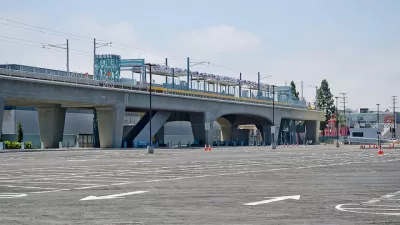Minneapolis took a large leap forward last week by approving a plan that would reduce parking requirements for transit-adjacent developments in a huge swath of the city—not just downtown.

"Buildings with few or no parking spaces can now be built outside downtown Minneapolis as part of a proposal that passed the City Council Friday [July 10, 2015]," reports Eric Roper.
"The measure tackles the city's typical one-spot per-unit parking requirement for new developments by allowing significant reductions near high-frequency transit. The final version was scaled back to allow only a 50 percent reduction for larger buildings, rather than freeing them from the requirement altogether.
"But the final language allows buildings with 50 or fewer units to be built without parking outside of downtown -- where there are already no parking minimums -- if they are a quarter-mile away from transit with 15-minute frequencies."
The article goes on to detail case supporting the reduction of parking requirements. Conspicuously absent are soundbites from politicians or local advocates dissenting from the new ordinance. The article does, however, further detail the compromises that produced the final version of the law. The article also notes that despite new regulatory flexibility, many banks require parking to finance development projects.
FULL STORY: Mpls. relaxes parking requirements to reduce housing costs

Maui's Vacation Rental Debate Turns Ugly
Verbal attacks, misinformation campaigns and fistfights plague a high-stakes debate to convert thousands of vacation rentals into long-term housing.

Planetizen Federal Action Tracker
A weekly monitor of how Trump’s orders and actions are impacting planners and planning in America.

In Urban Planning, AI Prompting Could be the New Design Thinking
Creativity has long been key to great urban design. What if we see AI as our new creative partner?

King County Supportive Housing Program Offers Hope for Unhoused Residents
The county is taking a ‘Housing First’ approach that prioritizes getting people into housing, then offering wraparound supportive services.

Researchers Use AI to Get Clearer Picture of US Housing
Analysts are using artificial intelligence to supercharge their research by allowing them to comb through data faster. Though these AI tools can be error prone, they save time and housing researchers are optimistic about the future.

Making Shared Micromobility More Inclusive
Cities and shared mobility system operators can do more to include people with disabilities in planning and operations, per a new report.
Urban Design for Planners 1: Software Tools
This six-course series explores essential urban design concepts using open source software and equips planners with the tools they need to participate fully in the urban design process.
Planning for Universal Design
Learn the tools for implementing Universal Design in planning regulations.
planning NEXT
Appalachian Highlands Housing Partners
Mpact (founded as Rail~Volution)
City of Camden Redevelopment Agency
City of Astoria
City of Portland
City of Laramie





























